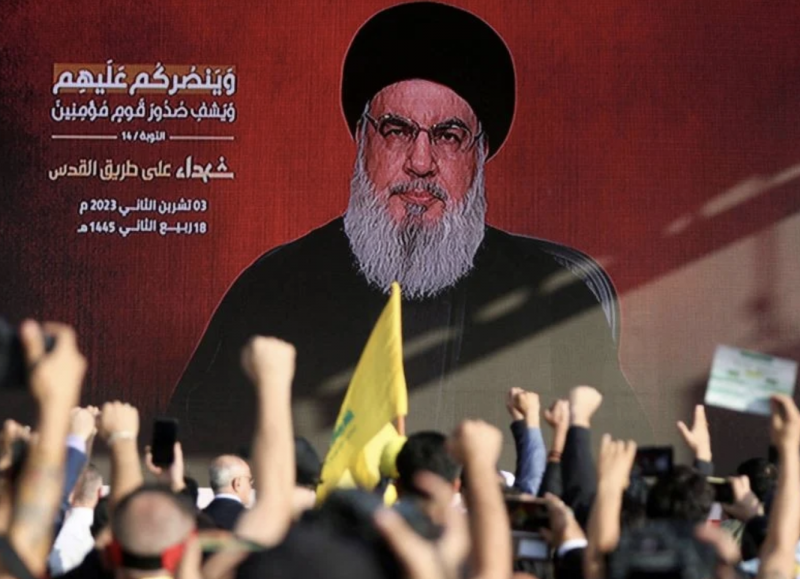
Hezbollah supporters attend a speech by Hassan Nasrallah broadcast on a giant screen, Nov. 3, 2023, in the southern suburbs of Beirut. (Credit: Mohamed Azakir/Reuters)
Hezbollah has intensified its activities on the Lebanese southern front after Iran’s unprecedented attack on Israel Saturday night, which was in response to the bombing of the Iranian consular annex in Damascus on April 1.
In the aftermath of the Israeli strike, Hezbollah leader Hassan Nasrallah said that there will be “a before and after” April 1, and the “Israeli response to the Iranian retaliation will determine the region’s trajectory.”
In addition to its regular operations since Oct.8 after Hamas attacked Israel, Hezbollah is now engaging in more sophisticated actions. These include mining the border region, as evidenced by an explosion that injured four soldiers from the Israeli Golani Brigade on Monday.
What’s more, the party is increasingly utilizing attack drones.
On Wednesday, a drone attack targeted the “new military reconnaissance headquarters” in the border town of Arab al-Aramshe, wounding at least 14 Israeli soldiers.
Hezbollah stated that the attack was “in retaliation against the enemy’s assassination of several resistance fighters in Ain Baal and Shehabieh” in southern Lebanon the previous day.
In response, Israel carried out an evening strike in the Bekaa targeting warehouses in Iaat, near Baalbeck, injuring two people.
The official National News Agency (NNA) reported three drone strikes on a residential area in the locality, which is a stronghold of Hezbollah.
This escalation occurred as Iran asserted that any attack on their country would prompt a robust and swift response, which may involve Tehran’s allies, notably Hezbollah.
By intensifying its military activities, Hezbollah is signaling to Tel Aviv its readiness to inflict direct casualties and escalate operations as needed.
Additionally, Hezbollah is cautioning Israel against any strikes targeting Iran, as this time Hezbollah will participate in any retaliation.
A Western diplomatic source who preferred to remain anonymous told L’Orient-Le Jour that Israel will retaliate against Iran, which will then prompt Hezbollah to join Tehran in its response to any Israeli attack.
“This provides the backdrop for the incremental escalation of Hezbollah’s operations,” the source said.
According to well-informed sources, Hezbollah’s destruction of a vehicle carrying soldiers from the Golani Brigade marked a significant development in the party’s operations.
Hezbollah planted explosive devices which were detonated as the Israeli vehicle passed, showcasing its infiltration capacity, its presence on the border and its operational agility.
The detonation occurred in the occupied Lebanese territories, an area effectively under Israeli control. It is situated in the western sector known as “Tal Ismail,” near Dhaira and the Jaradah site. It was previously the scene of infiltration operations by elements of Hamas’s al-Qassam Brigades during the initial days of the war.
This operation signaled that Hezbollah is beginning to shift its military tactics and is entering a new phase by directly targeting Israeli soldiers.
This development is likely to prompt heightened vigilance among Israeli forces and encourage them to be prepared for offensive actions as they conduct military exercises simulating a potential conflict with Lebanon or other fronts.
In addition to explosive devices, Hezbollah is increasingly resorting to drone attacks, showing the Israelis that despite their numerous raids in Bekaa, southern Lebanon and Rihan, they did not disrupt the party’s ability to transport missiles and weapons or to launch and operate drones.
This is despite Israeli claims of targeting storage and operating sites for these drones.
Same reaction from the Israelis
Like Hezbollah, Israel is adopting a policy of gradual military escalation, which reached a peak on Tuesday with the elimination of three Hezbollah commanders involved in operating missiles.
Through this action, Israel is also attempting to convey a message to Hezbollah that they are prepared to escalate and will target as many key figures within the group as possible.
Simultaneously, the Israeli army has concluded its large-scale military maneuvers. These exercises, conducted by the 91st Division, aimed to train soldiers to operate effectively in complex environments, considering challenging weather conditions and scenarios involving multiple casualties.
The 91st Division collaborated with the Air Force, the Israeli police and search and rescue forces during the exercise.
Also known as the Galilee Formation, the 91st Division is headquartered in the Biranit barracks, which were targeted in an attack claimed by Hezbollah on Wednesday. This division oversees the northern front with Lebanon within the Israeli army’s Northern Command.
These exercises involved a restructuring of the Israeli army’s military framework, which has been engaged in war for months in the Gaza Strip and is experiencing fatigue and exhaustion.
These exercises focus on specialized areas such as strategic strikes, assassinations and technological and ground warfare simulations. This indicates a thorough examination of various scenarios in potential confrontations.
Moreover, the Israelis are targeting main roads in southern Lebanon, implementing measures to isolate specific areas. There are indications that additional roads may be targeted to sever Hezbollah’s supply lines.
Simultaneously, Lebanon is receiving international messages warning that the situation is spiraling out of control.
“The Israelis are adamant about conducting a military operation to alter the status quo and establish a new reality that shields them from Hezbollah’s drones and precision missiles,” said a diplomatic source on condition of anonymity due to the sensitivity of the issue.
Furthermore, Israeli estimates suggest that Hezbollah possesses weaponry and advanced technology supplied by Iran.
Israel faces additional pressure due to the displacement of tens of thousands of residents from the border region with Lebanon. It can no longer settle for a “temporary” resolution of this issue, as the risk of another outbreak of violence looms large, potentially displacing them once again.
“Israel will intensify military pressure to achieve a comprehensive and definitive resolution, with all the implications it entails in terms of the risk of escalating the conflict,” the source added.
This article was originally published in L'Orient-Le Jour. Translated by Sahar Ghoussoub.